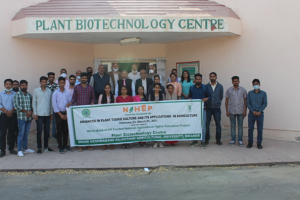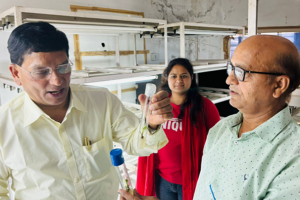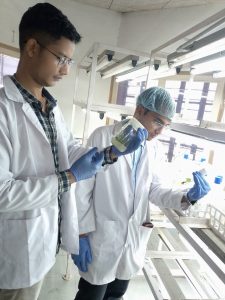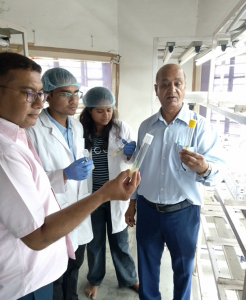Vision
The vision of Department of Biotechnology, College of Agriculture, Bikaner is to become a centre of
Excellence at the forefront of research and innovation in the field of plant biotechnology. The department’s
prime objective is to develop novel biotechnological solutions that address local challenges related to
plant vigour, food security, energy, and the environment.
To achieve this vision, the Department of Biotechnology will focus on several key areas:
Cutting-edge research: The department will undertake pioneering research in areas such as genetic
engineering, genomics, proteomics, metabolomics and bioinformatics. This research will aim to develop
innovative biotechnological solutions for various challenges in agricultural sector including: molecular
analysis of genes of agricultural importance, micropropagation of arid trees and fruit plants, study of
microbial diversity in arid agroecosystems
Education and training: The Department will provide high-quality education and training programs to produce
skilled professionals in biotechnology. This will include undergraduate and postgraduate programs, as well
as short-term courses and workshops for professionals.
Industry collaborations: The Department will establish partnerships with industry partners to facilitate the
translation of its research into practical applications. This will involve developing new products,
processes, and technologies that can be used in biotechnology, agriculture, dairy and other related fields.
Outreach and engagement: The Department will engage with local communities, government agencies, and other
stakeholders to raise awareness about the potential of biotechnology to address global challenges. This will
involve disseminating research findings, providing technical assistance, and promoting public dialogue on
issues related to biotechnology
Mission
Main mission of the department is to undertake teaching and research activities in Plant Biotechnology
especially on arid zone field and horticultural crops. To make students understand the importance of
environmentally fragile yet resistant germplasm, characterization and isolation of various stress gene
conferring tolerance to draught salinity extreme temperatures etc.
Mandate
• To impart theoretical and practical knowledge to students of Biotechnology
• Generation of skilled human resource in Biotechnology
• Molecular analysis of genes of agricultural importance
• Micropropagation of arid trees and fruit plants
• Study of microbial diversity in arid agroecosystems
Major activities
Seven days training organised by department on ‘Advances in plant tissue culture and its applications in agriculture’

Visit of Hon’ble Vice Chancellor to Plant Tissue Culture Lab

Students working in PTC Lab

Faculty and students in PTC Lab

Students working in Microbiology Lab
Any other relevant Information
No. of projects completed / running: –
(1) PTC R&D Project on Biotechnology of Arid Zone Crops. (DBT)
(2) Molecular Tagging of Economically Important Genes in Brassica. (BRNS)
(3) Development of Resistant Variety / Line in Cumin Against wilt (F. oxysporum) using in vitro techniques (ICAR)
(4) Molecular mechanism of iron induced chlorosis and carbon partitioning in arid zone crops Board of Radiations and Nuclear Sciences (BRNS, BARC, Mumbai)
(5) Improvement of Mothbean using radiations and Biotechnological approaches Board of Radiations and Nuclear Sciences (BRNS, BARC, Mumbai)
(6) Characterization of under-utilized plant species of Thar Desert. Department of Biotechnology (DBT, Govt. of India)
(7) Utilization of Khara Lana (Haloxylon recurvuum) and Date Palm (Phoenix dactylifera) for bioremediation of saline and water-logged soils of Rajasthan (DBT)
(8) Biotechnological Interventions for Sustainable Income Generation in Arid Region of Rajasthan (DBT)
(9) Bio-prospecting of Genes and Allele Mining for Abiotic Stress Tolerance. (NAIP, ICAR, New Delhi)
(10) Studies on heat tolerance in wheat under warm climatic conditions. (RKVY, GOR)
(11) Molecular Indexing of Drought Tolerance in Pearl Millet (RKVY, GOR)
